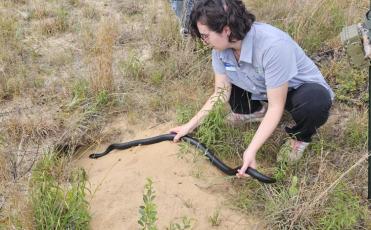
For most of us, this is the season that overflows with joy and goodwill. But we know that’s not the case for everyone. We know that for those who’ve recently lost a loved one, or who have strained relationships with their mom or dad, or who don’t have a group they can be with, the holidays can be joyless and lonely.
Even without the pressure of the holidays, more than half of the U.S. population is lonely. And it is literally killing them. A few years ago, a survey conducted by Cigna, the health insurer, reported that 54% of respondents felt as though “no one actually knows them well," 56% said the people they spend time with “are not necessarily with them,” and some 40% said they “lack companionship,” their “relationships aren’t meaningful,” and they feel “isolated from others.”
In his 2018 book “Them: Why We Hate Each Other and How to Heal,” Ben Sasse, incoming president of the University of Florida, cites several studies that show how loneliness affects the brains and bodies of millions of people. For example, lonely people get sick more often, take longer to recover from illness and are at higher risks of heart attacks. According to researchers at Ohio State University and the University of Chicago, chronically lonely people are more prone to Alzheimer’s disease and dementia. “Among epidemiologists, psychiatrists, public-health officials and social scientists,” Sasse writes, “there is a growing consensus that the number one health crisis in America is loneliness.”
And it is most acute at this time of year.
This can’t surprise us. We know that God Himself, after surveying the splendor of His new creation, observed, “It’s not good for the man to be alone” (Genesis 2:18). From the beginning, God revealed that He lives in relationship: Father, Son and Holy Spirit; therefore we, because we’re His image, are made to live in relationship, too — with our biological family, church family, close friends and neighbors.
These researchers have figured out that we’re social creatures. And after years of study, they’ve identified the four things humans need to be happy. Not surprisingly, they’re things the Bible described centuries ago.
First, they tell us, every human needs a family to love and who loves them. That’s what a healthy church provides. It’s why Jesus once motioned in the direction of his disciples and explained, “Here are my mother and my brothers! For whoever does the will of my Father in heaven is my brother and sister and mother” (Matthew 12:49-50). It’s why Paul told the Roman church, “Love one another with brotherly affection” (Romans 12:10). And why he explained to the Ephesians that they were no longer strangers, but … members of the household of God (Ephesians 2:19). The church is the family our lonely neighbors long for.
Researchers also found that we need people we can trust and confide in. They echo the writer of Hebrews, who told us centuries ago, “to stir up one another to love and good works,” and be constant encouragers (Hebrews 10:24-25). Like the author of Ecclesiastes 4, social scientists now inform us, “Two are better than one, because they have a good reward for their toil. For if they fall, one will lift up his fellow. But woe to him who is alone when he falls and has not another to lift him up!”
Third, secular researchers discovered that to be happy, people need work that matters. In Sasse’s words, they need “callings that benefit their neighbors.” Isn’t this why Paul told the Corinthians to, “… always (be) abounding in the work of the Lord, knowing that in the Lord your labor is not in vain” (1 Corinthians 15:58)? And it’s no surprise that the Bible teaches us to serve others “with a good will as to the Lord and not to man” (Ephesians 6:7). The church is where we labor together, motived by love and thereby find meaning.
Finally, researchers have learned that people need a worldview that makes sense of suffering and death. Said another way, they need to be sure that “(God) will wipe away every tear from their eyes, and death shall be no more, neither shall there be mourning, nor crying, nor pain anymore, for the former things have passed away” (Revelation 21:4). They need confidence that “this light momentary affliction is preparing for us an eternal weight of glory beyond all comparison” (2 Corinthians 4:17).
We’ve known these things for centuries. Still, we sometimes need reminding that the church possesses everything our lonely neighbors need. Let’s be sure, especially at this time of year, that they see our fellowship, are drawn by its magnetism and joyfully welcomed into the family.
Richard Doster lives in Fernandina Beach with his wife, Sally. He’s the editor of byFaith, the magazine of the Presbyterian Church in America. Reach him at ddoster@icloud.com.


